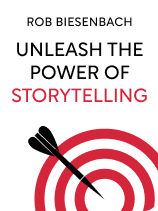

This article is an excerpt from the Shortform book guide to "Unleash the Power of Storytelling" by Rob Biesenbach. Shortform has the world's best summaries and analyses of books you should be reading.
Like this article? Sign up for a free trial here.
Why are stories powerful? How do they affect your brain? Why do manipulators use stories?
When Rob Biesenbach talks about the power of storytelling, he’s not just talking about a story’s capacity to engage or entertain. He’s also talking about how a story can change people’s minds, affect their emotions, and persuade them to act.
Learn how stories powerfully affect us emotionally, physiologically, and intellectually.
Why Stories Are Powerful
Why are stories powerful? We’ll look at the reasons that well-told stories affect our attention, perception, and emotions. We’ll also examine Biesenbach’s warning about how a story’s power to connect and engage us can be abused.
Nature Affects Our Perception of Stories, & Nurture Hones Our Attention to Them
Biesenbach contends that stories affect us powerfully for two reasons: stories are uniquely engaging to our brains’ processes of perception, and we’ve been socially trained to pay attention to stories. To explain how these two influences work, he explains them in terms of “nature” and “nurture” and shows how each can help you tell an engaging story.
The “nature” argument is that a good story captivates you because your brain’s processes of perception are uniquely responsive to stories. Biesenbach cites research that found that a compelling story causes the brain to release a hormone called oxytocin, which enhances our sense of empathy and motivates us to cooperate with others. Researchers have also discovered that listening to a story activates the same regions of the brain that come online when we personally experience the events described in the story.
(Shortform note: Not everyone agrees with the research that Biesenbach cites on oxytocin. Science writer Ed Yong (I Contain Multitudes) once characterized the hype around oxytocin as “dumb and dangerous,” explaining that this hormone has been linked to trust, cooperation, love, empathy, morality, and more. Yong argues that the evidence suggests otherwise, and how oxytocin actually affects the brain is probably a lot messier than the headlines indicate. When thinking about neuroscience, it’s also useful to keep in mind that most studies are very small. This means that many findings are statistically inconclusive: Conclusions that seem correct in a small sample size could be disproven in a study with a larger sample.)
The “nurture” argument is that stories capture our attention because we learn what to expect from a story very early in life. By early childhood, we’ve learned a set of basic expectations for what will happen in a story: There will be a setup, a climax, and a resolution. When these expectations aren’t met, we feel disappointed. (Think about what it feels like to listen to someone drone on telling an anticlimactic “story” with no conflict, no tension, and no satisfying resolution.)
| Nature, Nurture, and Our Expectations for Stories Just as nature and nurture interact to make us particularly responsive to stories, we can understand nature and nurture as influences that shape our expectations for stories, too. For instance, Matthew Salesses, author of Craft in the Real World, characterizes the “craft” of writing as a set of expectations that isn’t neutral. In his view, these expectations aren’t innate. Instead, the rules that we think a story should follow correspond to cultural preferences and societal norms, and Western literature looks very different from Asian literature or African literature. For instance, Salesses says that Western critics often criticize African literature for its “flat” characters, or label Asian fiction as “plotless.” But these differences in characterization or narrative arise because stories address culturally specific expectations. Some writers have criticized Salesses’s conception of literary norms as too simplistic. But his insight that storytelling entails engaging with your audience’s expectations can help storytellers consider whom they’re talking to and why they’re telling the story as they are. |
We Engage Differently With Emotions Than With Facts
In addition to engaging our powers of perception and attention, stories engage our emotions—and emotions are powerful. Provoking an emotional reaction in your listeners can help you persuade them to see things from your point of view—and to take the action that you want them to take. That’s because we respond to emotions very differently than to facts. For example, researchers tested narratives about climate change and found that stories were much more effective than facts in getting people to decide to act.
To illustrate why it’s so important to tell a story that gets your listeners to feel as well as to think, Biesenbach explains what happened to a patient who developed a tumor in an area of the brain that helps regulate emotions. After the tumor damaged this part of the patient’s brain, he could no longer make decisions. The research suggests that when emotion is impaired, decision-making is compromised as well. Without emotion, a story won’t push your listeners to act.
(Shortform note: The patient Biesenbach mentions appears under the pseudonym “Elliot” in neuroscientist Antonio Damasio’s book Descartes’ Error. Elliot’s tumor occurred in the frontal lobe, the same part of the brain of interest in the famous case of Phineas Gage, a railroad worker who survived an accident that drove an iron rod through his head, only to have his personality completely change. From these two cases, Damasio hypothesizes that emotion and reason are interdependent and that one can’t function without the other. In that case, it makes sense that a good story should appeal to our logical brains and to our emotions.)
Though we think we make decisions by using reason and logic, emotions often motivate or even determine our decisions. If you want your story to motivate your listeners to make a decision, making sure that your story has a solid emotional core is just as important as making sure that you have all your facts straight.
(Shortform note: We do many things that aren’t rational, like relying on emotions instead of facts to make important decisions. Elizabeth Kolbert, the author of The Sixth Extinction, explains that researchers continue to learn about the limits of human reason. Research shows that we deny scientific facts, dismiss new evidence, disregard weaknesses in our own arguments, and find emotion more persuasive than evidence because of the ways the human brain has evolved.)
The Power of Story Is Often Abused
Because of the way they engage our perception, attention, and emotion, stories are powerful—so powerful that people use stories to manipulate others. Biesenbach says that when you tell a story, you should resolve to “do no harm,” but many people don’t make such a commitment. Sometimes, people mislead their listeners by focusing their attention on sensationalized anecdotes that contradict the evidence or telling stories that appeal to their audience’s fear or vanity.
We should be skeptical of the stories that other people tell. Incentives exist for people, including professional storytellers like marketers, journalists, and political pundits, to exaggerate the drama of a story or to push an overly simplified narrative. It’s wise to check the facts, especially if a story sounds overwhelmingly positive or overwhelmingly negative.
(Shortform note: Stories are powerful, but there’s an ethical line between using a story to make people want to listen to you and telling them a story that’s not based in reality. In All Marketers Are Liars, Seth Godin draws a useful distinction between fibs and frauds. Fibs are stories that bend the truth in a way that benefits both you and your listener. But frauds are stories that deceive in a way that benefits only you and not your listener.)
| How Stories Engage the Brain We know intuitively that stories grab our attention, but scientists say this happens because stories engage our brains more fully than other kinds of information. Psychologists explain that it feels so natural to think in stories because we do it all the time. This is the brain’s natural form of information processing, one that brings more regions of the brain online than when interacting with other kinds of information. Similarly, neuroscientists have found that stories capture people’s attention and make it easier for them to process new information. Stories help our brains imagine social experiences that we’ve never been through ourselves. When we become emotionally engaged in a story, our brains become less likely to critically evaluate the “facts” in the story. That means that stories based on exaggerations or even outright falsehoods are just as engaging to the brain as those based on truth, and it helps explain how stories can be used to deceive people. |

———End of Preview———
Like what you just read? Read the rest of the world's best book summary and analysis of Rob Biesenbach's "Unleash the Power of Storytelling" at Shortform.
Here's what you'll find in our full Unleash the Power of Storytelling summary:
- How telling a story can make any message more compelling
- The unique power stories have to influence us and shape our emotions
- The crucial pieces that make up a story (other than the beginning, middle, and end)






